Oops, We're Feelin' Kinda Barfie...!

 It was that kind of day. You know, when the unexpected happens and although things seem all right, somehow nothing quite comes out right. Well, not entirely, but some things do fall by the wayside. Like when you're too deliberate, you try too hard, and the cookies just crumble.
It was that kind of day. You know, when the unexpected happens and although things seem all right, somehow nothing quite comes out right. Well, not entirely, but some things do fall by the wayside. Like when you're too deliberate, you try too hard, and the cookies just crumble.
Yesterday our daughter Karen worked from home. Just as well, the weather wasn't too great, we woke to freezing rain on top of an overnight snowfall, and we were expecting more of same. School buses in the area were cancelled, and I always feel better knowing they're not driving long distances in that kind of weather. And, as it so happened, Angelyne wasn't feeling well, kept threatening to upchuck. She'd slept badly all night, her mother said, and wasn't holding much down. That was fine, yesterday, meant we didn't have to pick Angie up at the bus stop after school and I had ample time to clean the house, then we went out for our ravine walk, and by that time I was really bushed, glad to have the afternoon to myself, kind of.
So this morning we had to get up earlier than usual, shower, and be downstairs for her morning arrival. Driving was bad again, because once again we had freezing rain, so they were a tad late arriving. Which meant that Karen stayed long enough for a hurried consultation on the state of the child, a quick cheek buss and off she went. Angie looked fine, although she's smart enough to maintain a certain look of constraint on her face lest her Bubbie decree that she looks good enough to go to school. Which, under the circumstances, wouldn't happen anyway, since she was genuinely not up to snuff.
She hustled up to the second floor to say good morning to her Zayde, and I wandered into the kitchen wondering what I could possibly feed the little sickie. When she came back down we consulted; she nixed an orange, a slice of cantaloupe, okayed strawberries. She'd try some dry toast, she said, and tea? is it all right if I have tea, Bubbe? Large oranges sectioned for us two, orange juice cut with cranberry for Irving, couple of eggs for him too, and toast, and coffee. For me, toast, banana, and tea, to share with Angie. Well, no chance to relax and look at the newspapers as usual, have to pay attention to Angie's ceaseless chatter. Don't have to feign interest; I am interested, and I nod now and again. This will all be history in two weeks' time when she and her mother move to their new house.
Cripes! forgot to call the school. I do that, and tell the secretary that Angelyne will not be in this day, day two of a flu condition. Thus forestalling a concerned call from the school from a volunteer.
What'll we do today? Can't go out for a ravine walk. No reason to go out, in fact, for anything, and isn't feasible in any event, with a sick child. I remind her to brush her teeth, and she goes into the powder room and sits down beside the toilet. What's wrong? I...feel like barfing, Boob. Oops, you can sit there 'till you feel better. She does, then wanders back into the kitchen and begins to open cupboards, peek into jars, fingers this and that, brings out a little malleable plastic Valentine with legs and arms and positions it this way and that. Because she's ill she has regressed from the usual pretend-tween/adult to child and it's now "look Boob, at what this little guy can do!".
Irving has long disappeared into the nether regions of the house, to do the preliminary work for a new set of stained glass windows. Angie watches me load the dishwasher and tells me she knows how to do that now, and will be able to work the dishwasher that's being left in their new, soon-to-be-occupied house. "Can I turn it on?" she asks, and does. Then she wants to work the coffee grinder that I keep specifically for grinding flax seeds. I'm still feeling a little unsettled, disgruntled, after opening a jar of flax seeds, half red, half yellow, and realizing, as I dumped the seeds into the top of the grinder that there appeared to be something suspicious about how they looked. I grabbed for my eyeglasses, and sure enough, seeds clinging by fine filaments to the mouth of the jar. Bloody damn, although I see nothing moving, I know there must be an infestation of some kind of beetle larvae in there, and dump the lot into the garbage, pull up the garbage bag, knot it and dump it into the large trash container in the garage, before hauling out another, larger flax seed-filled jar, this one uncontaminated.
How'd you like it if we make some puff pastry? You know those flaky pastries Zayde sometimes gets for you at the bakery? Don't know if I can eat it now, she responds doubtfully, but she encourages me to proceed, and I do. Simple enough recipe ingredient-wise, but complex in its manufacture. So we proceed to make the dough, then lather it with butter, fold, and roll it out, fold again, refrigerate for 25 minutes. Repeat three times, shape, bake. What a lot of silly nuisance. And how about pizza pockets for dinner? I ask her. Her face lights up, she carefully sips the cherry-flavoured tissane I've prepared, and watches me knead the bread dough.
Upstairs, I make up our bed, clean up our bathroom, and tell Angie to sit still so I can run the brush through her unruly hair. Which she washes but once a week, and then never runs a brush or a comb through until it's time for the next wash-and-brush. Her hair is so curly, so tufted and knotted and I proceed slowly and gently, but she protests and winces, and since she really isn't feeling up to par, I desist. Back downstairs to the family room, where we settle down with a book she's not familiar with, about a rural-dwelling pair of neighbour children who discover the presence of an orphaned fox kit in a nearby wood, and tame it. As I'm reading to her, Irving comes back upstairs, dumps himself into a chair and listens until the tale is done. He loved it, he said, listening to the story, just like old times, so relaxing, and pleasurable. Angie liked it all right, too, but she's unresponsive when I suggest that she pull out another book and read it herself.
Lunch time, so we discuss her options and she ends up with a small bowl of chicken noodle soup, more toast, this time with mozzarella cheese melted over it, another bowl of strawberries, and apple juice. She holds it down nicely, and I haul the disappointing-looking confections out of the oven. The puff pastry dough into which I'd inserted raspberry jam and shaved coconut looks fairly unattractive, but she's game to try one and insists it's pretty good. I go outside with Riley because he hasn't been out in too long, and he's kind of stinky. While he disports himself in the new snow in the backyard, I shovel off the deck, the stairs and the network of trails we leave open for him and Button.
Later, we shred mozzarella cheese, chop mushrooms, red, yellow and green peppers, open a tin of tomato paste, roll out roundels of the bread dough and begin to fill them. No vegetables in Angie's, she has instructed, just tomato paste, sweet basil, pizza seasoning and cheese; veggies for her mom and for me, and in addition to that in Irving's, thinly-sliced bits of pepperoni. They'll be baked later, in time for dinner, but the work has been done, only a salad to prepare now, before dinner.
I feel sorry for Button and Riley, no walk for them. So we throw Button's ball for her, and play tug with Riley's plastic hamburger, throwing it as far as we can whenever we can tease it out of his jaw, so he goes scrambling madly to retrieve it. We take turns, either rolling Button's ball back over to her, whereupon she gently gnaws it for a few seconds, before hitting it with her snout back in our direction, or tossing Riley's hamburger for retrieval. We play until they, and we, become bored and tired of the game.
How about looking at some old photograph albums? Sure, Bubbie, why don't we? But Irving has come upstairs, muttering something about taking a photograph of one of the stained glass doors upstairs, as he wants to use the design as a guide for a new cartoon he's doing for the new windows. Aha! I tell him, I've already done that, and we troop upstairs to the computer, and go through all of the photos in the "stained glass" folder I've got, until he finds the one he wants, and we print it out. He's happy, goes back downstairs with it, and Angie and I haul out a few old, coming-apart albums, part of our vast album collection of photographs old and new. "Who's that? she asks, and I respond that it's my mother. Egad, I'd ask the same in the same tone of voice. We flip through the pages, look at old-old pictures, and her attention soon lapses, so I keep calling her back to look at baby pictures of her mother.
She's feeling better, much better: each time the telephone rings she leaps to answer it. Once, it was my down-East sister-in-law calling to apologize for taking so long (not that I minded) to call in response to my having sent a few pieces of jewellery down for her and Rachel, when my kid brother Billy was last here. I mention that I'd forgotten to send him birthday greetings on the 20th, and she laughs, telling me about the surprise party at a local restaurant she had arranged. They'd arrived a full 45 minutes after their friends because he kept piddling about doing things before she was finally able to successfully haul him out of the house. I ask her why she puts up with him, he's such a schlep, and she says she thinks he's wonderful. Meanwhile, Angie thundered downstairs to see her Zayde, to tell him the latest gossip, that George-Ann had called, and who is George-Ann, anyway?
Finally, release. Karen arrives at five to four. I haul out her share of the pizza pockets and a newspaper article I'd cut out for her to read. Karen is on her cell phone all this time with her best friend who is bemoaning miserably about something, while Karen keeps clucking in sympathy. Finally, they leave, and we hurriedly pull on our jackets, ditto for Button and Riley and we're off into the ravine for a walk before dinner. Nice to be out, finally, and the dogs are happy about it, rushing about hither and yon sniffing happily. The footing, despite the morning's new snowfall, is far better than it was yesterday, and we're back home just on the cusp of five.
Fear+Hatred+Denial = Vicious Persecution
It's an age-old formula and one that has proven time and again that it is fool-proof. You can convert most of the people most of the time. Most people can be reasonable, can overlook the fact that some people are by nature different than they are. Aside from the fact that most people don't want to be perceived as being different. For in sameness comes acceptance. And acceptance equals tribal inclusion. Anyone outside of the norm, not part of the tribe, which protects its own, is fair game. Even so, people can be persuaded by their own innate sense of decency and compassion that even those outside their clan should be treated with basic civility. Personal tastes and discrimination aside, most people think, under ordinary circumstances, that those unlike themselves can be tolerated at a distance. And thus is distance kept, a minuet of acknowledgment if not quite acceptance.
Yet people are also susceptible to manipulation of the grossest kind. Threaten anyone's stability, their place in their society, their own well being and material possessions and you lay wide open the opportunity to coerce, persuade, distort, malign and irreversibly alter the landscape of acceptance. Allegiance to tribe, to association of like, whether it be through religion, geography, ideals or ethnic origins exerts a far stronger grip on the imagination than the idea that even those others who do not share a like background are worthy of inclusion.
Instil fear in people by disturbing the equilibrium of their existence and hatred is bred. From hatred comes denial; denial of equality, of worthiness, of consideration. At that point the adversary real or imagined can be singled out for punishment of any kind, including the kind of vicious persecution leading to expulsion and ultimately death.
We've seen that scenario played out ad infinitum, from ancient history to the present. In the last few years alone, parts of Africa and eastern Europe have demonstrated just how slight a veneer civilization is, how close humans are to the primeval urges to consolidate territory, to vanquish competitors for advantage in the ongoing search for adequate food, shelter, mates. Here too the world deplores, yet looks on, ostensibly helpless to effect a rescue.
But the universal long ago became specific in its identification of a sole identifier for suspicion, accusation, fear, hatred, persecution, expulsion, death. The specific becomes the universal Jew, wherever he or she may be, the pariah among nations.
Wearily, Jews world wide once again live through the despair of seeing the leader of a country identify Jews, accuse Jews, deny Jews, commit to wholesale slaughter of Jews. The new and duly elected President of Iran has pinpointed his country's evil nemesis: Jews. Jews who control world media, banking, exclusive clubs, military, who have tentacles reaching into every country of the world for ultimate domination. And Israel personifies that dedication to total domination, intending, as he claims, to stealthily, determinedly take over the entire Middle East. And from there, the rest of the world. It bodes ill, does it not, for a leader of a populous and wealthy country to publicly insist that his country has the right and the blessing of god to destroy another, neighbouring country?
We've seen it before, we'll see it again. And let's hope that the consequences will be different this time around. Other nations cannot be benign, but forgetful and well-meaning yet ineffectual on-lookers forever. Or can they?
Then there is the spectre of Israel's closest neighbour with whom a disputed and long-overdue settlement can finally find agreement, voting overwhelming to install their own leadership sworn to the obliteration of the Jewish State. Oh, I don't for one minute believe that there doesn't exist countless upon countless Palestinians who deplore and despair of the situation, who wish nothing other than to find and secure a lasting peace between Israel and the Palestinians, which could inevitably spread throughout the entire region in a final settlement of agreement and mutual prosperity. Wishing, alas won't make it so.
Realistically speaking, we all know what happens to those who disagree with the militant hatred-mongers: that old dictum, that "you are either with me or against me" plays out daily with the death of moderates at the ruthless hands of militant tyrants and their followers. Again, fear comes into play with those people who have succeeded in maintaining their humanity being forced to hide it for fear of sharing the fate of those their leaders have earmarked for destruction. It becomes easier to hoist one's intelligence far, far up on a shelf until such time, in retrospect, one can haul it back down again and begin to think rationally and experience true regret for inaction. Too late.
Survivors write books, promulgate recognition of the wrongs done against them and their kind while the world looked on passively, but with regret. The right-minded will murmur what a dreadful shame it was, how it might have been different if they'd only understood the extent of the horror, and such a thing will never, ever be permitted to happen again on their watch. And the world grinds on.
Hey! How'rya?!!
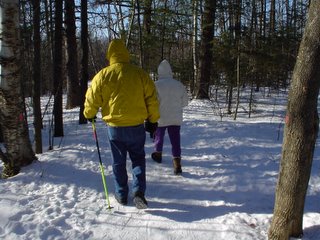 Yesterday was a lalapalooza of a day. Weather-wise, that is. Unexpectedly mild, and sunny as well. How's that for 28 January in Ottawa? Well, unusual, and to be celebrated. How else but by going for a walk in the ravine. At least to start the day. What a difference from the day before...the snow-burdened branches of elderly pines were no longer caught, stuck to the snow on the ground - release! The ice which had begun tentatively once again to cover the surface of the creek was now fast receding. Plump clusters of snow were falling steadily from the encumbered branches overhead. Glistening in the glare of the sun were tender branches outlined in ice, the snow slithering steadily from their now-uncertain perch.
Yesterday was a lalapalooza of a day. Weather-wise, that is. Unexpectedly mild, and sunny as well. How's that for 28 January in Ottawa? Well, unusual, and to be celebrated. How else but by going for a walk in the ravine. At least to start the day. What a difference from the day before...the snow-burdened branches of elderly pines were no longer caught, stuck to the snow on the ground - release! The ice which had begun tentatively once again to cover the surface of the creek was now fast receding. Plump clusters of snow were falling steadily from the encumbered branches overhead. Glistening in the glare of the sun were tender branches outlined in ice, the snow slithering steadily from their now-uncertain perch.
Chickadees were perkily springing from branch to branch and offering their saucy view of this splendid day. And standing pensively halfway over one of the bridges as we approached was Suzanne, whom we haven't seen in the ravine for ages. Since she and Barry put down old Della their incursions into the ravine have been rare. Barry is finding it as difficult as Della had to get around now, as he's lost much of his vigour in the wake of his prostate cancer surgery. But Suzanne is almost twenty years younger than her husband, and she has adopted one of her neighbours' dogs, Scooter, a burley pseudo-Schnauzer, (poor dog, his owners had his voice box removed...rather, they said, than putting him down, as he just wouldn't stop barking, um) for walks in the ravine of late, she explained to us.
We walk on together, talking of old times, speaking of current events. When we begin another ascent we see a group above at the head of the trail, sitting on what's left of an old wooden bench. And when we come abreast, we stop to speak briefly with the man, woman and teen-age girl, all of whom are wearing snowshoes, all of whom are interested in our three dogs, particularly our little Riley, lively and cute in his little patchwork winter coat. After her initial greeting to these people whom we've never seen before, but who appear to be interested in maintaining a conversation, Suzanne moves on with Scooter. Suzanne tends to shy away from contact with people she doesn't know, she's slightly less sociable than we tend to be.
As we stand there speaking with the couple, discussing the ravine in general, the exquisite splendour it has gifted us with visually in the last week, we're soon aware of a bearded man ascending the hill toward us. He stops well before reaching us to place his dog, a husky mix, on the leash, and we can now see how he is straining to keep the dog beside him. He warns us as he continues to ascend that his dog is hostile, it's a rescue dog. We pick up our two, Button and Riley, to permit him to pass without obstruction, and still manage a brief friendly comment as he passes.
Eventually we catch up to Suzanne again, as she stands huddled with Scooter, obviously keeping him from forging ahead as he's wont to do. She explains that she wants some distance between Scooter and the husky in view of the warning the owner had given, but she's forgotten to take a leash with for the dog. We offer one of ours and walk on together, as the man and his dog make good time ahead of us and are soon lost to view. I find it interesting to note that Suzanne, some dozen years younger than me and using a walking stick, proceeds at a slower pace then me, and when we're clambering uphill her level of difficulty appears to exceed mine.
Makes me think back to my own habit of always starting strong, going on ahead, then flagging as time goes on and the going gets tougher. Instead of carefully measuring exertion, taking it slow and steady. Almost two decades ago the futility of my way of proceeding was really brought home to me during a mountain trail excursion with a group just outside Tokyo. The other hikers, all younger than us two, a mixed group of young Germans, Australians, British men, and a matching group of young Japanese men and women were starting out on our hike, from the trailhead near a small village. I forged enthusiastically ahead as usual, raring to go, in love with the scenery before us, and before we'd gone halfway, some several hours into the hike, I was so tuckered out I just had to stop and rest and felt utterly debilitated. The rest of that hike saw me straggling behind the rest of the group and I felt pretty silly about it.
******
Today, we ventured out a little earlier than usual into the ravine as we've a winter storm warning in effect and already snow had begun to fall and the temperature was about ten degrees colder than yesterday. We wanted to avoid having to put winter boots on Button and Riley, so off we went, into the mean wind which, once we'd descended into the ravine, no longer bothered us. We can hear it swirling the tree tops above as it keens through the atmosphere. Today the sky is a dark silver-grey and the only birds we see are a few crows flying high above. In the distance we hear the sounds of barking, evidently more than one dog, and large ones at that.
Eventually we come abreast of the cause of those sounds, straggling toward us, as one large dog after another comes into view and far back of the dogs a small herd of dog owners, chatting together as their animals charge through the woods off-trail. When they see us and as we approach nearer some of the dogs veer back toward the trail in our direction. Each of us swoops up a dog; my husband picking up Button as I cradle Riley in my arms and try to cover his muzzle, for he's barking like a little lunatic. The other dogs, thank heavens, move alongside, then past us, and their owners are soon abreast and we utter the usual civilities. Just as we've passed what seems like surely the seventh person, my husband stops suddenly and I look up to see Harry's almost-forgotten face.
Truth is, I walked right past Melissa who had greeted me and I returned the greeting, but hadn't realized just who it was. As the others forged on in their dogs' wake, we cluster in our little group of four to greet one another like long-lost friends. Which in fact, we are. Harry and Melissa and their dog Jack were some of the original ravine walkers whom we'd known fifteen years ago up until just a few years ago when they gradually stopped appearing in the ravine as Jack, an overweight, bandy-legged, stubborn, runaway, leash-hauling Beagle got older and increasingly feeble. They'd had to put down their beloved Jack back in October, they said. His legs could no longer hold him up, his kidneys were going.
I looked closer at Melissa, realizing why I hadn't recognized her. Gone was the bloom in her face; she'd lost weight and looked gaunt; long vertical lines creased her face and her smile was not quite what it had been. Her father, she said, had died in December. And Harry had undergone a series of operations which had left them utterly depleted. I guessed: "prostate?" It wasn't, he explained to my husband, the prostate removal itself, although it was bad enough, but everything associated with its removal that had caused such physical anguish. His body seemed to shut down, kidneys, back pain, and in fact he'd finally had such difficulty urinating several more operations followed. But on the mend! And thinking about replacing Jack, although he wasn't replaceable.
We'd stood together talking for so long that we were all getting pretty cold, and finally said our good-byes, while promising we'd see one another more frequently in future. As we parted, along came Sydney, shaggy-haired and insouciant as usual, his owner plodding along behind. Hellos all around, and further explanations about Jack, then we proceeded on with Sydney and company. Retirees all, as it happens. And Paul, whom we see still often, said he and his wife were raring to go, their breakaway was only three weeks on. To the Barbados, where his wife's chronic rheumatoid arthritic condition always goes into abeyance. They're waiting for her father to be released from hospital. Where he's been for almost two months, following a series of heart operations, but he's now stabilized and recovering from the last.
Time to finally part, and wend our way back toward the final portions of our walk, up the last long hill, out to the street, and home. We're on our way downtown, well over to the opposite end of the city to visit another of our old haunts, the stained glass shop where my husband gets all of his supplies. And that's another story, another adventure, another set of greetings and conversations.
Holocaust Remembrance
This is the day deemed to be International Holocaust Remembrance day. Thank you, international community. A kind gesture. Gestures are a form of diplomacy. In this instance a diplomatic, perhaps kindly nod in the direction of the world's eternal scapegoats. Gestures cost little, in the sense that they can be brought out after an event to indicate that there is a recognition that something was...perhaps not quite right. In the sense of fairness, of shall we say decency, human decency. Humankind, after all, besides being brutal beasts when it so suits us, are also intelligent beings, and we know, certainly we do, that a human being is a human being. And all life is equally valuable.
A human being becomes degraded in the eyes of others when it becomes a socially, historically expedient aim, so that when a group is so decreed to be "different" in the extreme, it is to render any members of that group beyond compassion, a ready target for anything another group wishes to subject it to. Including extermination. We permit these things to happen. If evil is not directly aimed at us, we demur, turn away, permit destruction to proceed. The face of evil is so very banal, as Hannah Arendt wrote.
It is because from among the aggregate too few can be bothered. Whether it is to care what "the others" do, whether it is to assert right over wrong, whether it is to remain true to the self closer to the angels than the demons within us, whether it is to deny history it's less palatable, less memorable moments in time.
Why, one might reasonably ask, does the world require a scapegoat in historical perpetuity? Can we divide society into the psychopaths who feel compassion for no one, the weary undistinguished-among-their-peers plodders who wish nothing but to get on with their lives unburdened by unnecessary thought and action: those who wish not to bring attention to themselves, and those whose untrammelled egos demand all action be focused on their needs alone?
Jews themselves do not really require a specific day dedicated to remembrance. Jews live every day of their lives in stark memory of the holocaust, that signal event in Jewish history reminding Jews of their true place in the societies which they inhabit. Whether holding themselves apart from the general stream and herding themselves into ghettoes, or deliberately assimilating into the mainstream of the societies they inhabited it made little difference. Jews have always been perceived as being different, hostile to the prevailing mores and ethics of society, while said mores and ethics were lifted from their originators, those very despised Jews themselves.
From among the world's Jews have come, disproportionately to their population size, Jews of genius bearing gifts to the world at large. Outstanding contributions in the fields of the arts and pure sciences, culture and medical science, physics, government, the humanities in general. From Solomon to Jesus; from Spinoza to Mendelson; from Freud to Kafka; from Trotsky to Einstein, and countless others whose existence enhanced life on this earth. Irrespective of which, Jews remain the everlasting pariah.
Historically, dictators of one kind or another have deflected baleful attention from their ill rules to blame the Jews, the avaricious, mendacious Jews for the trials that befell others; it was their machinations, their evil inclinations which resulted in endemic poverty that caused populations to suffer, not the greedy manipulations of their rulers.
Not much appears to have changed. Although Jews mournfully promise "never again" the world, nodding sagely in agreement, still holds Jewish populations accountable in a way no other group will ever be. The tiny State of Israel, struggling to exist, to provide a safe haven for Jews, a haven denied them almost everywhere else on this earth, continues to be held to a standard impossible to maintain under the constant deadly duress brought upon it by its implacably hostile neighbours.
It is to weep into the abyss of the past. It is to plead against the unreason of the present. It is to rage against the bleakness of the future.
Cat Lover?!
Well blow me down. A cat lover. Isn't that nice? Anyone who likes animals cannot possibly be all bad, now can they? Who would have thunk? Stephen Harper loves his wife, he loves his children. And evidently he also loves his cats. So what's not to like about the man?
See here, there was a great photograph of this man, the next prime minister (-elect) of Canada, in the newspaper. And there was a wee kitten in the crook of his arm. How disarming. How perfectly sweet. How can any man who cradles a kitten possibly be the stuff of socially progressive nightmares?
Something must have been wrong with the camera, though. For here was a photograph of a man who, admittedly, has been much photographed of late, so that anyone who is unfamiliar with that signal face within this country can certainly not have been awake much of the last several months - with a cat! Actually, there were several photographs, one of which showed him back in 1999 with a few of his pet cats. And what was Mr. Harper doing? Oh cute! you'd never guess. I'll put you out of your misery: he held, in each hand, detached beaters evidently used to whip up what? whipping cream for a delectable cake his wife had doubtless baked, and he was proferring each to each one of his cats. Each of which responded predictably, quite as a cat should. Lickety-lick. Hey, nice practise.
What a lovely man. What's more, he addressed the nation today, in this, his very first news conference since becoming prime minister-in-waiting. And he sounded, well, prime ministerial. He spoke first in French, then repeated his address in its entirety in English. A not-very-subtle message - we get it Mr. Harper! Hop on board, Quebec.
Take a long walk on a short pier, Ambassador Wilkins. Who cares whether you're spouting the official American line, telling us Canadians that you don't much care for the Conservatives' intent to have Canadian ice breakers patrolling our far northern coastline. That's our Stephen, yay! Prime prime ministerial comportment, if I ever saw/heard it, yes indeed.
A new governmental accountability will be put in place. Bet your life on it. Parents of young children will be assured that they will have choice (conservatives believe in some types of choice) when it comes to child care, and watch that money roll out! Health care will be vastly improved, and waiting times will be significantly shortened, be assured! The streets of our cities will be safer because those criminals who have us cowering in fear will henceforth face tough, tough, tougher sentencing, mark his words! There is more, lots more, lots to encourage trust in this new government.
This new government which will govern in a most careful manner for the next little while. At least until it's toppled for some reason or another. But it will have left behind in the sake of its short governance a sense of well, well being? In the sense that nothing truly earth-shaking will have occurred during its tenure, anything like revealing what we all fear: God help Canada!
Um, then we get a chance to vote them back in, right? Keep the Liberals in the dungeon of public opinion where they deserve to be (and they certainly do deserve that) for a little longer; good game plan. Where were we? oh right, vote the Reform/Alliance conservatives back in, invite them to govern with a majority. And the gloves are off!
Hey, he's a cat lover. Funny, that icy blank look of no depth which seems to this onlooker to indicate it belongs to a misanthrope is still there. Disinterested cat eyes.
Gawd, what a misery I am.
Shopping at Chez Salian
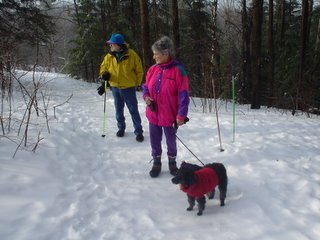
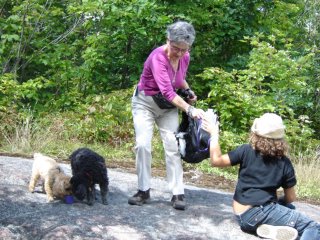
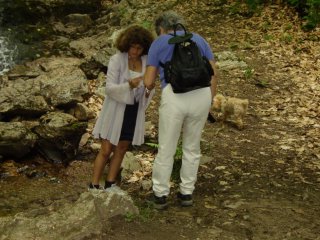 I really enjoy Tuesdays. Like Saturdays, it's the one day I don't really have any household chores to be done in the winter. True, there's meals to think about and prepare, but on the whole the day is mine to do with as I wish. That's when I can do plenty of reading, among other things that make my day. It's also Seniors' Day at our local Sally Ann Thrift Shop. And on occasion, once we've got our ravine walk done, we pack up the dogs and off we go to see what we can see. My husband doesn't mind, in fact, sometimes he will even initiate a visit. When he's worried that his stock of detective or mystery novels is running too low for comfort, and he would like to see what's available in that department.
I really enjoy Tuesdays. Like Saturdays, it's the one day I don't really have any household chores to be done in the winter. True, there's meals to think about and prepare, but on the whole the day is mine to do with as I wish. That's when I can do plenty of reading, among other things that make my day. It's also Seniors' Day at our local Sally Ann Thrift Shop. And on occasion, once we've got our ravine walk done, we pack up the dogs and off we go to see what we can see. My husband doesn't mind, in fact, sometimes he will even initiate a visit. When he's worried that his stock of detective or mystery novels is running too low for comfort, and he would like to see what's available in that department.
Off we went yesterday. Each of us carries one of our dogs in their own shoulder bag, and they don't mind, they're accustomed to this. Since they'd prefer being with us under any circumstances than being left at home, without our presence. They've made that sufficiently clear over the years. And while I wouldn't at all mind leaving them on their own at home for a little while when we have things to do which shouldn't include them, my husband will not. We deposit each of them in the child seat of the shopping buggy we pick up as we enter the store. Button and Riley soon realize they're kind of tired after our trail walk, and settle down to snooze while we poke through the items packed tight on the racks.
I look through all of the winter coats and jackets, some of which look hardly worn at all, some of which look quite intriguing, but alas, all of which are far too large for my relatively slight frame. Too bad. Not that I really need another coat or jacket, but it's an interesting enterprise to look about and weigh their potential value to one's wardrobe. Might find something irresistible and decide to trade in a well-worn item of one's own in exchange for acquiring the other. I do discover a few cotton tee shirts, one of them a turtle-neck, which I dislike the look of on me, but appreciate the utility of, on a cold day. Also a nice pink cotton vest which will be very useful I've no doubt. I try on several pairs of obviously factory-new footwear which are also obviously very old stock, but discover them to be too narrow-lasted, which explains their presence there.
My husband discovers a nearly-new fleece vest which boasts lots of zippered pockets and is fully acetate-lined, which fits him perfectly. He has a thing about such vests and is the proud owner, from the same source, of a number of them, all of which find favour with him and get worn regularly. He has also found a number of books several of which he wants to review with me, as he's not interested in them himself but feels I might be. One, the Epic of Gilgamesh, we already own a copy of and it is returned to the shelves. Two others he has selected are just down my alley: M.G. Vassanji's "The Gunny Sack", and Frances Itani's "Deafening", both of which I've read fine reviews of and am glad to have in my collection.
As we amble about, much attention is given to our two little dogs' presence, briefly awakening them from their notional slumbers. Button, older and wiser, pays scant attention to the oohs and aahs, but impetuous Riley revels in the ruckus and plays to his adoring audience. Which includes the staff of the store, well accustomed to seeing them both accompanying us there.
Because it's Seniors' Day we receive a nice discount. I've also selected a blouse that I hope will fit our granddaughter. It's the style that she favours, the material she likes, the colour she claims is her favourite. I don't actually ever try anything on in the store. When we take these things home, I put them in the washer, then try them on. Anything that doesn't fit is just re-cycled to them, not returned for refund, since it's all part of our support of the work they do. As (bad) luck would have it, the top doesn't fit Angelyne, and she is very graceful about my obvious lack of discernment.
Along with our receipt, we're given a printed notice that there's going to be a 50%-off sale on Friday. The salespeople urge us to come back. As usual, we laugh and tell them once a week, once every two weeks, once a month is more than sufficient for us. We'll leave the 50%-off bargains to others. To myself I think: I knew it! Any time the racks get that stuffed, they've got to move things out...voila! sale time!
Going through the newspapers this morning what do I see but some grand sale advertisements and I point them out to my husband: Look at this! the Sally Ann has taken out a full-page advertisement in the paper! No kidding! I show him the full page spread, picturing a sophisticated-looking, business-clad woman with the legend "Get Dressed..for Less" writ large across her bosom. And below: "WINTER SALE save up to 70% today through Sunday!" Wow, competition for Chez Salian at the Rideau Centre!
The Intimacy of Forest Sounds, Techno and Nature's
 It's the fourth day since that last big blast that left the ravine trees ravishing in white. Pine branches, normally held high, bowed low under their unaccustomed winter weight, are now stuck onto the snowy ground and we continue to weave our way through them to descend into the ravine. Although some clumps of heavily-deposited snow are now missing, leaving picturesque gaps on boughs, branches and twigs, an overnight dusting has done its best to fill those gaps, and once again we are confronted with that magical scene of white, utter white everywhere we look. The density of branches, normally bare of covering not their own, now blanketed entirely, constrain sight lines. One cannot see beyond the immediacy of the wonderfully whitely laden branches, twigs and boughs, an interconnection, criss-crossing of nature's finest display.
It's the fourth day since that last big blast that left the ravine trees ravishing in white. Pine branches, normally held high, bowed low under their unaccustomed winter weight, are now stuck onto the snowy ground and we continue to weave our way through them to descend into the ravine. Although some clumps of heavily-deposited snow are now missing, leaving picturesque gaps on boughs, branches and twigs, an overnight dusting has done its best to fill those gaps, and once again we are confronted with that magical scene of white, utter white everywhere we look. The density of branches, normally bare of covering not their own, now blanketed entirely, constrain sight lines. One cannot see beyond the immediacy of the wonderfully whitely laden branches, twigs and boughs, an interconnection, criss-crossing of nature's finest display.
Even as we proceed today under a pewter sky bereft of sun unlike yesterday, a light scattering of wind coaxes sufficiently to rain a dusting of snow off an uncertain perch. Even larger branches are shedding the occasional clump, falling gracefully below to add to the trail's snowpack and enter our jacket collars. Soon we're aware that this intermittent fall has been joined by a light snowfall which, as we continue on our way intensifies, further enhancing the white embroidery surrounding us.
The winter hush we'd experienced in previous days appears to be missing. Some unknown change in the atmosphere? Sound is making its way through the ravine, especially as we ascend to the flats and hear the muffled sounds of construction and traffic reaching us, making their way through the trees. It's mild enough that we soon see a black squirrel halfway up a slender sapling, its form clearly visible on its insufficient perch. Our little dogs see it too, and race toward the tree, to watch as the squirrel leaps to the trunk of a great old pine and is soon lost to sight within its snowy heights.
In rapid succession as we tread forward, another two squirrels, leaping over the snowpack into the embrace of close-by trees, but these two are not silent like their black cousin. They scold us shrilly in rapid-fire squirrel ire at our presence in their territory. Not far from where they wax indignant a bevy of tiny chick-a-dees flick from one branch to another, sounding their song, forgiving of our presence.
Delving deeper into the forest, leaving the heights, we hear behind us the sonorous sound of church bells from the steeple on St.Joseph Boulevard. It must be noon. The sound follows us growing fainter, fainter, then ceases. We hear our own footsteps scrunching rhythmically, as we proceed down the hill toward a bissected trail, where we decide which way to proceed this day.
Another sound that we hear on occasion and always thrill to; the ghostly call of a train whistle from some point far in the distance, repeating itself in a melancholy slur as it approaches one crossing after another. Becoming, like the church bell, fainter and fainter until its sound is heard no more, leaving us nostalgiac in memory of our younger days when such sounds were a gentle reminder of technological progress.
Odd, how conflicted we feel about sounds signifying the presence of mankind and our inventions, as opposed to those of nature. How we prefer to regularly steal away from the reality of the present, the ever-present sounds and noises in constant reminder of our intrusive presence on this earth.
We thrill to the benign nature of the natural sounds which emanate from nature's creatures as we intrude upon their domain. Little wonder they express irritation with our presence, as we've pushed them further away from their habitant with our relentless occupation of land that was once theirs and ours, now rarely theirs and mostly ours.
Canada Has Voted - Haven't We?
Well, we threw the bums out. Isn't that the formula? Give the incumbents enough rope to hang themselves - alternately to rule the country intelligently, and if they come up short - throw them out. They did it (they didn't do it) ergo: we did it. To our great puzzlement. Let's hope it is not, ultimately to our great detriment. Did we have a choice? Other than to toss them in the dustbin? Nope. Did we have other choices? Debatable.
So now Canada has, sigh, a new Conservative government. Make that a Reform/Alliance/conservative government. There's the rub. Now the question is: what can we anticipate from this unholy alliance of right-thinking collectives?
Much has been said of the "natural governing party" of Canada, that it has always been, will always be the Liberals. And didn't they muck things up, didn't they just! Enough said of the shortcomings and outright misery of the Chretien governance years. Paul Martin was to be the great white hope of the Liberal party, so Martinite hacks would have it. Let's say, for the sake of argument that Paul Martin hadn't been irreversibly tainted by his own financial conservatism on behalf of Canada, that same conservatism that had him, as Minister of Finance gut Canada's social programs, beggar the provinces who in turn shunted responsibility off to the municipalities causing everything to come to a sad and shuddering halt. Let's say that this is a man of deliberation, a calm decision-maker, not a smoke-and-mirrors clown who could make deficits disappear and fiscal year-end surpluses of immense proportions miraculously appear. This wouldn't mean, of course, that Canadians have been seriously over-taxed, of course not. This might not be one of the reasons that Canadians' disposable income actually declined over the past several decades.
Not that Canadians mind all that much paying taxes, even those on the high side. Not if we're assured that the money is soundly allocated for services that matter most to us: health services, education, affordable housing, urban infrastructure, child care, elder care, affordable utilities, workable crime prevention, that kind of stuff. Oops! Hey, we're talking federal government - oh but, don't transfer payments and trickle-down look after this? Yep, yep.
All right, the federal government interacts with its international confreres, and, we would suppose, in a helpfully fraternal manner. The federal government looks after federal institutions, right? like the military, to make certain that they're in reasonably good shape? The federal government decides how to forge ahead with international relations, how to commit Canada's resources in peacekeeping services. The federal government tries to keep a handle on our primary resources from metal extraction to forestry resources, to farming, ensuring agreements are in place to protect and promote Canadian industry, culture, and our standard of living. And the economy is booming! So big corporations, banks, manufacturers are doing all right, thank heavens. But what about the ordinary man and woman on the street, why is their spending power declining? Why do we have more homeless people, why do we continue to appeal for more assistance for food banks? Nuisance problems, all - aren't they?
So we have these enormous surpluses, and the overall standard of living is in decline? Hit me with a hammer, it makes no good sense. Ah, the surplus is doled out in ways we cannot hope to understand. Of course. Of course. Good thing there's no waste and mismanagement because if there's one thing almost everyone hates to see in government it's waste and mismanagement. We've got to find some other reason for the breakdown of critical services to the public. Probably our fault in one way or another. It's only human nature to become arrogant and unresponsive when you've got the power and other guy hasn't, nah, nah. And you've got to acknowledge and pay off debts to friends and colleagues and sometimes that takes a back-alley approach and big bucks.
So we threw them out. Now what've we got? Wonder if the ultra-right evangelical set in the world of American politics is right now high-fiving all over the place. Finally, a government next door with whom we can genially do business. Big time. Reform-Alliance, after all, share the same fundamental background whether in Canada or the United States; we're one big continent when it comes to that. Our new prime minister is prepared and ready, oh so ready, to take the helm of the ship of state. And we put him there, we certainly did, minority or not. This is a man who disdains the necessity of giving a helping hand to welfare types, the working poor, those whose ideas of social justice don't conform to his. We knew that once and shunned him, but he's become shrewdly clever in opposition - and he's got us!
Now it's God Bless Canada.
It's so Cold! It's too White...!
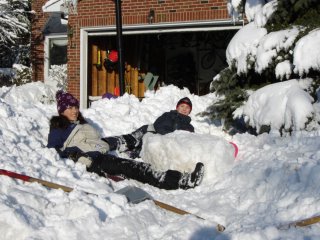 The voice, when it responded was bereft of its usual bounce and sparkle.
The voice, when it responded was bereft of its usual bounce and sparkle.
What's wrong?
Nothing.
I can hear there's something bothering you, what's the matter?
Nothing's the matter, Bubbie.
Did you have a good day at school? Was everything all right there?
Yes. It was a good day.
Then what's the matter, why do you sound like that?
Oh, I hate winter!
You hate winter? You're a little Canadian girl, you live in a cold climate, you should be used to winter. How can you hate winter? You're always outside playing in the snow!
It's so cold! It's too white!
It is, but that's what winter is supposed to be like. Did you wear your gloves today?
Yes, it's not that, it's just that it's too...cold.
Well, since when did that matter to you? Are you repeating something someone else said?
No.
Listen kiddie, it's only old people like me and Zayde who are supposed to complain about the cold, not little girls and boys, who love winter and the snow it brings.
Well, I guess that's wrong!
Well, guess what?
What?
Your Zayde and I are going away, to Florida, to get away from this cold, this too-white snow.
You're not!
Oh yes we are, why shouldn't we?
You're not going, you like the winter here.
What makes you think so?
You always say!
You're right, we're not going away, we like it here.
I knew you wouldn't, you wouldn't like Florida, anyway.
Well, we thought it was kind of interesting when we were there.
You were there? When!!?
Oh, before you were born, long before you were born. We just happened to be living close by there at that time.
Oh.
Guess what we liked about it there?
What?
The trees that grow there, they're really different than the ones we have here. And there were lizards that crawled up the tree trunks, that was neat.
Eww! Bubbie!
What's wrong with lizards, they're nice little creatures?
Eww, you're kidding!
Not at all, just imagine that they're like miniature crocodiles, alligators.
They're not!
Sure they are. And guess what else we saw, little white birds on stilt-like legs who ran about trying to catch those lizards.
Ugh! I guess you're not going back.
No, we're not, we've seen enough of that place, and guess what? we really like living here in all of our seasons, winter included.
Sure, Bubbie.
Our Wondrous Winter Ravine
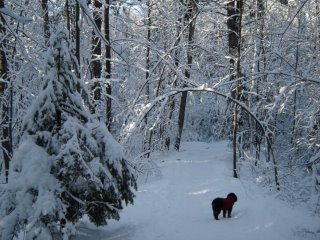
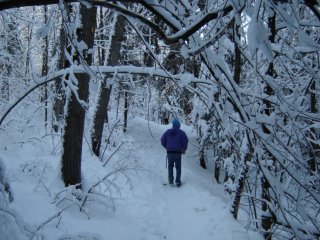

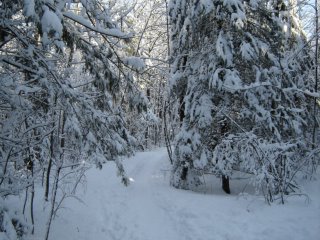
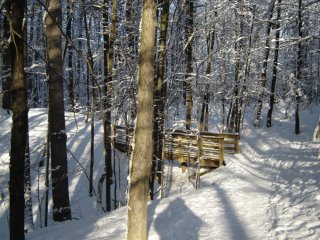
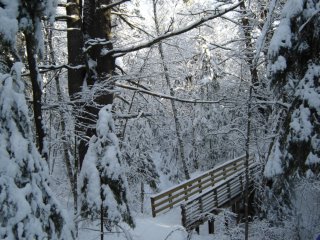 The ravine looks just as exquisitely ravishing today as it did yesterday, in the wake of the previous day's winter snowstorm which left absolutely everything lavishly carpeted in a thick layer of snow. So often after a heavy snowfall there is a brief window available to view the aftermath in the forest, when the trees are laden with their soft white blanket and our breath is taken away in wonder at the utter perfection of the sight. Ah, but this snowfall was somewhat different, in that the snow fell during a relatively mild temperature in thick clusters which, when they hit the ground, were suffused with water. These were not the usual light crystals which themselves give us such pleasure, brief through the aftermath of their beauty is, but water-logged tufts of snowbundles. The snow clung immediately to their targeted hosts, and remains there yet. Only slowly will this thick blanket permit the odd wayward wintry wind to haul down reluctant drifts. Only gradually will the winter sun gaining in warmth as it draws inevitably toward the spring equinox begin to melt this tender but tough snow covering. A discerning eye, striding through the ravine, looking toward the sun can make out ice crystals clinging to weary tree branches where the snow has been convinced to leave its perch for the present.
The ravine looks just as exquisitely ravishing today as it did yesterday, in the wake of the previous day's winter snowstorm which left absolutely everything lavishly carpeted in a thick layer of snow. So often after a heavy snowfall there is a brief window available to view the aftermath in the forest, when the trees are laden with their soft white blanket and our breath is taken away in wonder at the utter perfection of the sight. Ah, but this snowfall was somewhat different, in that the snow fell during a relatively mild temperature in thick clusters which, when they hit the ground, were suffused with water. These were not the usual light crystals which themselves give us such pleasure, brief through the aftermath of their beauty is, but water-logged tufts of snowbundles. The snow clung immediately to their targeted hosts, and remains there yet. Only slowly will this thick blanket permit the odd wayward wintry wind to haul down reluctant drifts. Only gradually will the winter sun gaining in warmth as it draws inevitably toward the spring equinox begin to melt this tender but tough snow covering. A discerning eye, striding through the ravine, looking toward the sun can make out ice crystals clinging to weary tree branches where the snow has been convinced to leave its perch for the present.
This day when we enter the ravine ducking and weaving our way through the heavy-laden pine boughs brought sweeping to the ground reminds us yet again that this wintry phenomenon is so ephemeral that we are indeed fortunate to view it once more before it disappears. Our senses absorb the spectacle of branches covered so thickly in this white mantle that it is as though some artist run amok has outdone himself in his frenzy to create perfection. Conifers and deciduous, bushes and wayward twigs, towering giants and tender saplings alike are burdened, the former sporting snow-weary branches hanging as low as their height will permit, the latter forcing slight trunks to a graceful bow.
Walking the trails we're amazed to see stout trees normally accustomed to bearing multitudes of ripe fall fruits with easy grace, brought low by the heft of this white, white coverlet. We must, perforce, walk now through bowers, our own heads hung low to avert their clustered appeal. This day too the ambience is muffled, still, quiet. But still we can hear the soft swish-swish of our boots compacting the snow underfoot. And from a near perch on high we hear the shrill impertinent cry of a Pileated woodpecker looping off the stillness above.
Even the water coursing through the creek winding its way below is hushed, its banks pillowed by huge white puffs of snow. This latest snowfall has brought perilously low a number of trees whose already-tenuous hold on the banks edging the creek have been urged further downhill, their hapless trunks now laterally engaged across the creek. And we wonder will they ever recover or are they destined ultimately to cross to the opposite bank and there moulder in another season.
Snow Falling on Pine Boughs
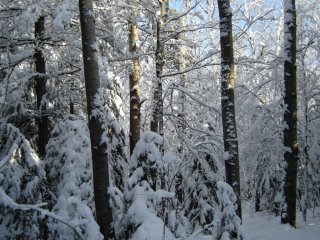
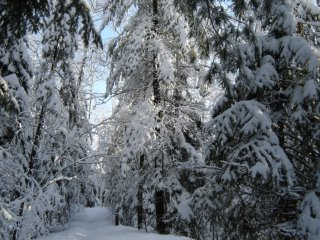
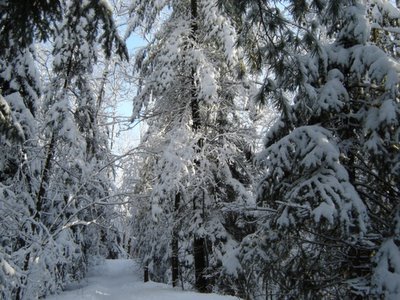 The snow swooped and flowed in fluffy, thick bundles, and it came down in swift determination. In the space of a mere few hours we received well over 15 cm, which was just fine, since we badly needed that snow to cover the icy remains of our previous snowfalls, transformed from the softness of new-fallen snow to sheer glass by the freezing rains that followed. And can anyone think of anything more beautiful to behold on a Saturday morning when you've slept in late, to get up and look out the bedroom window to behold snow thickly littering the sky with its promise of opportunities for the day to come?
The snow swooped and flowed in fluffy, thick bundles, and it came down in swift determination. In the space of a mere few hours we received well over 15 cm, which was just fine, since we badly needed that snow to cover the icy remains of our previous snowfalls, transformed from the softness of new-fallen snow to sheer glass by the freezing rains that followed. And can anyone think of anything more beautiful to behold on a Saturday morning when you've slept in late, to get up and look out the bedroom window to behold snow thickly littering the sky with its promise of opportunities for the day to come?
This snow was, besides being much anticipated and beautiful to behold, also very wet, so that wherever it fell it stayed and it built up and became a snow structure of fabulous invention on anything and everything it settled upon. Nothing outperforms nature at this game of fabulous, ethereal, tenuous art. Perfect for sliding for area children. Perfect for rolling into great heavy gobs of packing snow the better to hit you with, my dear friend. Perfect for shaping into those solid orbs which, when packed together, emerge as your friendly neighbourhood snowman, the better to greet you with, dear onlooker.
This is the kind of snow that absorbs everything into its complete pristine whiteness. Vision becomes impaired when the sun crisps up the glittering white, bearing tree branches down, down to sweep in a gentle arc over the landscape. Not so simple to shake branches clear of this type of snow; it clings, it refuses to sprinkle off its host, and only time and sun will gradually clear trees and branches of their unbearable burden of glory. This is the kind of snow that muffles sound, so in its presence one is embraced by its white silence. This is the kind of snow which, though thick underfoot, scrunches nonetheless as one pads quietly in its presence.
Birches and beech, mere juveniles in the order of their tender age, bow long and low in obeisance to their new master, this full mantle of tender white. Young trees which managed to survive the relentless ice storm of 1998 with their long slender trunks in perpetual arcs are now brought lower to the ground. Cedars bend under the unaccustomed weight of their bough-filled snowpack. Towering old pines, their needle-full branches and boughs brought in a sweeping arc to touch the ground look like ballgown-clad patricians. Yet here and there appear snow-laden limbs of pine and spruce severed from their bodies, littering the snow-soft ground.
The sun reaches its bright rays through the interstices of laden branches to further illuminate frozen white crystals. The trees, shrubs, become an intricate cathedral of shining truth, a place where one views nature's wonderful caprice. Our minds, our memory is not equal to the task of recalling the opulence of this moment. We must savour it for the moment, regret its transience, and consider ourselves blessed for the opportunity to revel in this magic kingdom.
Our Wonderful Winter Garden
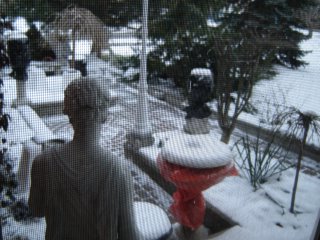
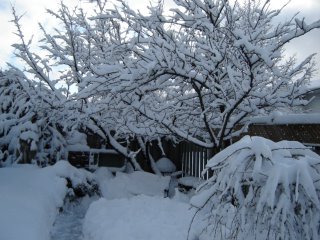
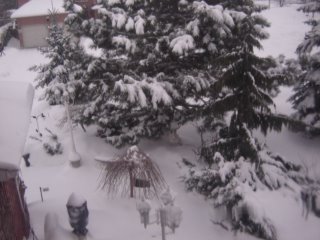
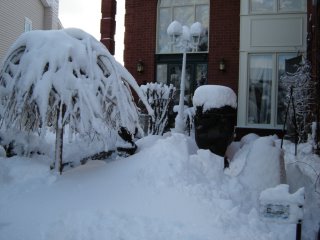
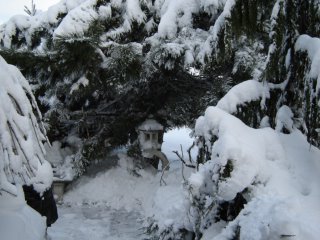 Winter garden? can there be any such thing? In Ottawa, that northern capital which boasts it is able to endure cold and snow unlike many other capitals of the world? Does anyone ever really go out into their garden in winter? To have a look at what once was? Can anything really, truly be seen? Well, hardly. Everything is covered, month after month, with an unrelenting blanket of snow. And quite often that snow itself is covered over, with a slick of ice. What could possibly be seen in a garden at this time of year? Nothing much, actually.
Winter garden? can there be any such thing? In Ottawa, that northern capital which boasts it is able to endure cold and snow unlike many other capitals of the world? Does anyone ever really go out into their garden in winter? To have a look at what once was? Can anything really, truly be seen? Well, hardly. Everything is covered, month after month, with an unrelenting blanket of snow. And quite often that snow itself is covered over, with a slick of ice. What could possibly be seen in a garden at this time of year? Nothing much, actually.
On the other hand, we do have evergreens, don't we? Well, of course, and also deciduous trees. The former lovely to look upon at any time of year, the latter not much to offer in winter, other than some species' beautiful exfoliating bark. Let's face it, who in their right minds would want to be out there wandering about at this time of year in any garden? Not many, myself included. The joy of gardening, of potential, of possibilities, of colour, of form, of texture, of fragrance, it's all missing.
One looks out onto the garden from inside the house, wistfully. Spring will come. Eventually. And then, and then, things will bloom. All those bulbs one worked to deliver into the fall-waiting garden, they will feel the warmth of the sun on the soil, and come to ecstatic life, gifting us with their desire to show off their glowing colours, reminding us that summer will follow and with it warmth, inviting us into our gardens for months upon months of coddling perennials, annuals into glowing gardens of pleasure to satisfy our winter-deprived aesthetic.
The snow is beautiful in and of itself. It falls regally, gladdening our hearts in quite another way. We can disport ourselves in snow-covered landscapes, gliding over the snow in skis, snowshoes, skating our long canals of icy adventure. We are, after all, Canadians. To avert our eyes, our intentions from making the most of winter recreational opportunities is to painfully trudge through winter, is to despise what nature has gifted us with in this season.
And look! the garden becomes something entirely else. It is beautiful, it can take one's breath away to see the long pine, spruce, fir branches emblazoned, embroidered in winter white, a thick layer of fresh-fallen, fluffy snow. Adhering lovingly to the branches of hardwoods, softly sifting onto bushes whose bold branches can still be seen rising above the snowpack, layer upon layer.
True, we don't feel invited to linger overlong in the cold, observing this arras. Snow-laden benches do not entice our bottoms to descend upon them for the purpose of contemplating yet again this further evidence of nature's benign intervention in our lives. But what pleasure we derive from this brief and fleeting and most appreciative of inventories. Our winter garden.
Suffer the Children....
When I was a child my parents who were immigrants from Europe, lived with me in a rented flat in an inner-city house on Manning Avenue in Toronto. As a child it did not occur to me that we were not owners of the house, although I was aware that another family lived in the downstairs of the house. My parents rented a small kitchen at the back of the second floor, next to which was the bathroom which all the inhabitants of the house used. Next to the bathroom was a very small room which was my bedroom, later shared by a sister younger than me by four years, and next to that room a larger one at the front of the house which was my parents' bedroom. That bedroom had a radio in it and on Friday nights we would all gather around it to listen to Friday-night radio dramas. The little kitchen was where we spent most of our time. There was another room at the front of the house, also rented out, usually to older single men.
By today's living standards my family would have been considered to be economically disadvantaged. To my recollection I was never hungry. I did become aware, as time went by that the clothing I wore was donated by friends of my parents whose own children had outgrown them. I also became aware that I had very few toys, other than a few which were similarly donated. That small house on Manning Avenue housed a family of two adults, two young boys and a dog on the bottom floor, a family of two adults, one, then two, and eventually three children on the second floor, along with another, unrelated renter.
I recall dimly being offered a tissue box by the older male renter and this excited me greatly; a box of tissues, even my parents never bought anything so luxurious. It was either that man or another one of the many who succeeded him who displayed his genitalia to me whenever he caught me alone in the hallway outside his usually-closed bedroom door. I thought his behaviour strange and a little disgusting, also exciting, I really wanted that box. He did eventually hand it to me with a grand gesture of giving. It was empty, and I was disappointed. When I was a little older, perhaps six or seven, and the boys downstairs were in their early teens, occasionally one of their boyfriends visiting after school might catch me in the bathroom and reveal themselves to me just as the older man had.
When I became old enough to attend school there was an elementary school just up and across the street from the house where I lived; Manning Avenue Public School. I became increasingly aware that some children attending the school were entitled to special treatment. Showers were installed at the school for the benefit of these children. Meals were served at the school for these special children. These children were given such attention because there were no bathing facilities where they lived with their parents and often food was in short supply for these families. Although the knowledge was there of such special treatment for certain children, I'm not certain that anyone really knew who these children were.
I knew a little girl who lived down the street from where 'our' house was. A dark-haired little girl, my age, a little larger than me, whom I played with from time to time. Eventually, she brought me home and I saw the interior of a dark and tiny cottage. Her father, she explained to me, was blind. He spoke quietly to me, seemed busy with what I took to be a huge magnifier, and writing tools. When I asked to go to the bathroom my friend told me cheerily that there was no bathroom. Later, when I spoke of this to my father, he became grim and explained they were poor people, although I wasn't certain what that meant.
Next to the house where we lived there was another house, and it was full of Italian immigrants. There was a little boy who lived there with his parents, but we seldom played together. He was a little bit older than me, and we had very little in common. His parents invited me into their house at Christmas so I could admire their bright and colourful Christmas tree. I'd never seen one before. An old woman sat always in the kitchen of that house, knitting, interminally knitting. Scarves and toques, all of them the same dark brown-green colour. For the soldiers, fighting in the war, I was told. But not by her, as she spoke no English, not even the sometimes-hesitant mangled English my mother spoke then.
I knew another little girl who lived on a street next over from the one I lived on. She was a classmate, and we spent a little time together, but not all that often. Once, I boldly accompanied her to the other street and she took me upstairs to where she and her family lived. It was a dark and cold place. No one else appeared to be home. She led me to a cupboard, to show me something really special. We could look, she said, but not touch. She withdrew a can, opened the lid and we peered inside. It looked unappealing, and I was not able to identify it, although even I could see that it was fairly inedible looking due to its age and contaminated state. Honey, she told me proudly, it was a tin of honey.
Up the street again, past the school, lived another child my age. She lived in a house her parents owned, with her four older sisters. Behind their house sat a factory which they also owned. The factory produced seltzer water and ginger ale. On occasion I was permitted to enter the factory on a week-end when production had ceased, where I saw primitive conveyer belts and bottles, lots of bottles. One of the few indulgences my parents regularly indulged in was a bi-weekly delivery of seltzer water.
I would sometimes accompany my parents on a regular shopping foray on College Street. We would enter a long narrow shop whose walls were lined with shelving carrying all manner of groceries and boxes. Fresh food was kept in a long windowed display and at the counter were landsmen of my parents, immigrants like themselves. My mother would carefully, judiciously, decide what she could purchase, and the man would use a long pole with pincers at the end to reach up to the various shelves to draw down the articles of my mother's choosing. That family, parents and three young boys, lived upstairs in several rooms above their shop.
Another little girl with whom I'd occasionally play brought me to her home occasionally. She showed me a secret display which was brought out only once a year. She was a child of Japanese extraction, and what she showed me was a set of girls' day dolls, a Japanese emperor and empress and their retinue in tiny perfection. That child, the same age as me, was gradually losing all her teeth. All of us children at the school used to get regular yearly dental examinations; we would line up for them and any child who was deemed to need dental work was sent to Orde Street Public School where a dental facility was set up. We feared and hated that school. This child was being fitted there for a set of false teeth.
This was a time when ice-boxes sat in kitchens, not refrigerators. When ice would be delivered daily, the ice piled in a wagon being pulled by horses. Horse-hauled wagon delivery was still a common sight in Toronto at that time, 65 years ago. There were cars being used also of course, and trucks, but there were still plenty of horse-drawn wagons in use. There was nothing approximating supermarkets; there were grocers, butchers, individual shops set up across the city. A drug store then was a pharmacy, not a place to buy goods other than pharmaceuticals. Salvation Army bands would often be seen playing in the streets, gathering crowds of onlookers.
When I was older and we'd moved finally to a house on Concord Avenue which my parents managed to buy, I had other friends. None of the girls I knew then appeared to be living as precariously as the children I'd known at a much younger age. But there were girls, when I was 12 and 13 who dressed inappropriately (I considered myself one of them, but for a different reason...that my clothing was second-hand, ugly, ill-fitting and worn...) for their age and wore make-up that made them look much older than their years. These precocious young girls left school at an early age, became unwed mothers, and ended up as movie 'hostesses', low-paying jobs they would never rise above.
Canada is different now. We aid our immigrants. We have food banks, something that did not exist all those years ago, not in that same form in any event. We have social services to assist people in adapting to our economy, our way of life. The kind of poverty I knew second-hand as a child should not exist in a country as wealthy as Canada is. So what happened? Immigrants who had somehow, without the help of the government, managed to pull themselves into better economic positions eventually were able to give their children a better life. Now, with government intervention, offering language assistance, job searches, subsidized housing, educational opportunities, we appear to have a far greater proportion of the population in dire need. Among them, we are told, a million Canadian children who go to bed hungry each night. We need to ask ourselves how this can be.
Icy Winter Walk
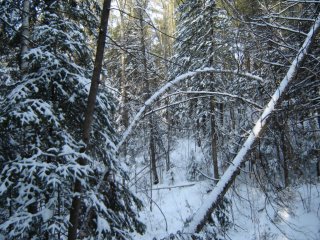
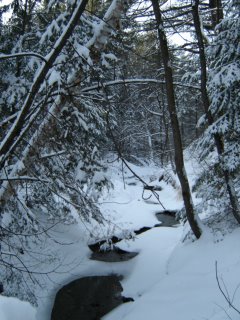
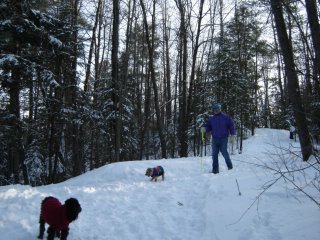 Time to get out with the dogs. Temperature minus 14 degrees celcius. Winds gusting to 15 mph. Sun's out, don't look a gift horse in the mouth, you might find rotten teeth. So we haul out our gear, get everything ready. Don't want to keep the poor little dogs waiting on us too long, geared up in their hated equipment. We partially dress ourselves: long johns, check; wooly socks, check; headgear and heavy mittens at the ready; check. On to the dogs. Riley is biddable, comes when he's called, even though he knows what's up. Button is altogether another story. She cringes, tries to hide. Not because she doesn't want to get out into the ravine and roam about sniffing the wind and all those delicious pee-popsicles awaiting her avid attention. Because she knows she won't be happily hoofing it but plodding along, that's why.
Time to get out with the dogs. Temperature minus 14 degrees celcius. Winds gusting to 15 mph. Sun's out, don't look a gift horse in the mouth, you might find rotten teeth. So we haul out our gear, get everything ready. Don't want to keep the poor little dogs waiting on us too long, geared up in their hated equipment. We partially dress ourselves: long johns, check; wooly socks, check; headgear and heavy mittens at the ready; check. On to the dogs. Riley is biddable, comes when he's called, even though he knows what's up. Button is altogether another story. She cringes, tries to hide. Not because she doesn't want to get out into the ravine and roam about sniffing the wind and all those delicious pee-popsicles awaiting her avid attention. Because she knows she won't be happily hoofing it but plodding along, that's why.
When it's this cold, plus the wind, never mind the sun, it's cold, cold. The street leading to the ravine has been heavily salted. When dogs' paws come in contact with that street salt, then march along in the ravine trodding on snow and ice the result is cruel discomfort. Our dogs need not worry, in any event, because when it's this cold they've got to wear booties, otherwise they wouldn't be even plodding along, we'd have to carry them. Their feet are so small (matching their bodies, of course) that they simply cannot take prolonged exposure to the cold. So it's on with their winter coats (Button has a hood on hers which she heartily detests; she much prefers the heavy wool sweater she can get along with when it isn't quite this cold. Riley has to wear two coats since he's smaller and feels the cold more acutely) and then their boots. I'd given them both haircuts two days earlier so they're less winter-shaggy than usual, which means the boots have more wriggle-room. Good news for them, bad for us, as we know we'll have to keep "adjusting" them throughout our walk. Damn.
But we're finally out. We've got it down to a fine art. And we carry them over to the ravine, the few yards up the street from where our house is to ensure their leather-bottomed boots don't get full of salt and end up deteriorating. At the entrance to the ravine they're dumped and they begin to plod along the narrow ice-bound path toward the long hill which we'll descend to drop into the ravine. Even the snowpack is completely ice-crusted. We've got our cleats clamped over our boots, otherwise we'd be doing one long slide down the hill. We hear the screws in the cleats clamping through the ice, and feel sure-footed thanks to them. Button and Riley pick their way carefully around the ice patches alongside the bits of snow clinging to the ice, to keep from slithering.
Riley, our little bumptious male, doesn't mind the occasional slide, but Button, our smart little ladydog considers any slides she hasn't herself deliberately engineered to be an assault on her dignity, and she hates them with a fine passion. Once down the long hill, though, they hit their stride and skip along. Literally. Skip, that is; poodles do have a tendency to skip along from time to time on one hind leg, raising the other jauntily in the air as they proceed.
Despite the cold, we see first a tiny red squirrel racing along the frozen snow between trees, then a black squirrel high up on the trunk of a large old pine, and finally a grey squirrel leaping its way overhead from one tree to another. If our little dogs weren't in plodding mode, they'd leap to attention and make every effort to head off at least one of the squirrels, but they know the effort would be wasted in a futile attempt to keep upright on the frozen landscape.
During the first part of our walk we'd heard a concatenation of crows somewhere out over to the far left of the ravine. They sound almost like spring mobbing, when they're all excited about the change of seasons and get together to boast among themselves about having endured yet another miserable winter and lived to tell about it. And we also hear, in the far distance, much later in our walk, the unmistakable high, hoarse cry of a raven. We pass a long-dead white birch whose sizeable trunk had been recently assaulted by a Pileated woodpecker, the snow below the tree heavily littered with large splinters of wood.
It wasn't long after we entered the ravine that clouds began to move in, obscuring the sun. Not that we were able to feel much in the way of heat from the sun in any event, threading our way through the trails; first through a valley, then up again ascending another hill, making our way through the heights, encountering another descent into yet another valley which leads invariably to yet another long hill to ascend, which, having scaled it, immediately descend from its cusp to clamber up yet another hill. That's the ravine and its contours.
We've had to stop repeatedly as either Button or Riley come to a dragging, or an abrupt halt because one of their boots has managed to come loose and slip down their leg. We've got to haul it off the skinny little leg, and manoeuvre it back into place and moor it with the help of the sticky anchors I sewed onto the fleece boots. Patience, patience. They're no happier than we are with this irritating ritual, and we each persevere, playing the game over and over until we manage to traverse our usual walk, up hill down dale, and feel the better for it.
As this daily ravine hike takes us in a large loop, we cross the creek several times; at one juncture near the start of our hike, and yet again at a different place, when we're within ten minutes of our return circuit which will bring us once again to the last long hill we ascend to come out at the street where our house sits. The creek had just about frozen over this time last week, but in the interim we'd experienced a real thaw accompanied by freezing rain. The freezing rain had impacted rather deleteriously on the snowpack, leaving behind a glittering frozen trail, and the creek had run free once more, swollen with the results of the melt. Now, with several days of a typical January cold snap, the creek is slowly beginning its freeze-over again.
Every day offers us a slightly altered landscape. As familiar as we are with the layout, the look of the ravine, and its trails, there is something "different" about it each time we're there.
Israeli-Palestinian Rapprochement?
I used to count myself among the many supporters of Israel's right to exist alongside the Palestinians by saying that Israel should take steps to remove its settlements. And then, guess what? everything would be solved. The Palestinians would have their land, the Israelis would then live in peace with their neighbours and all would be well. A perhaps reasonable assumption that two old adversaries could find accommodation with one another for the well-being of their populations. What reasonable onlookers might assume otherwise, after all? Give a little, get a lot. Give up land taken taken during a defensive war of attrition, and get badly needed security. Dream on, McDuff.
Israel is populated largely by normally intelligent, fairly moderate, ethically-bound citizens of the 21st century. From the ingathering of Jews from around the world came a multitudinous population of diverse backgrounds but with a solid underpinning of like aspirations: to live in peace in their own little corner of the world. With a population roughly approximating that very number which perished in the concentration camps and gas chambers of the Holocaust. Was it too much to ask for?
Evidently it was, according to other inhabitants of the geographic area, a part of which was partitioned off to accommodate a new state which would bring together the Jews of the world who believed in a place of their own. These largely urban, urbane and urbanized people who came from the cities and shtetels of Europe and North America, with an expanding trickle from Israel's surrounding Arab countries came to form a coherent population seeking refuge from a world which had always rejected them.
Little did they fully understand that they would become an island in a region of tribalism, of mouldering ethnic resentment, of truly elemental hatreds, of warmongering xenophobes. The nascent state discovered the truth of the situation soon enough, and has remained embattled ever since, yet never losing hope that the potential of the sweetness of human nature might prevail. Although Jews originally hailed from the Middle East, and developed their ethos and beliefs there, as well as their genius of religion, they appear not to have recognized that they were surrounded by an eternally primitive-natured population of tribal revenge and ritualized mayhem.
Well, perhaps they did. Their early leaders may very well have, recalling Golda Meier's dismissive comment with respect to the Palestinians. If a penchant to reasonableness and accommodation, good will and neighbourliness is absent how does one discuss matters of partnership in geography? If a neighbour you've not yet met formally indicates his displeasure of your settling into a home in the neighbourhood by driving a tractor through your new home do you feel this is just an awkward message from Neighbourhood Welcome Wagon?
Enmity begets enmity and that's just human nature. Most people, both Israelis and Palestinians, would like nothing better than to live their lives peacefully, in security and with a promise for a future in which one's children will surely prosper. I have no doubt whatever that most Palestinians would much prefer to live alongside their neighbours with mutual acceptance the order of the day, but the fact is there are so many bitterly-engaged militants in the population intent on murder and chaos that it just is not going to happen, bar a miracle.
So Gaza was emptied of its settlements of Jews to enable Palestinian Gazans to take control of the land, to bring order and begin a long journey toward prosperity for people desperately needing a hope for the future. After all, the European Union, the United States, Canada, Russia, China, all inferred that this sacrifice by Israel would move both peoples closer to peace and accommodation. Yet, it was the containing wall that Israel built despite world-wide condemnation which brought to a standstill the deadly murder-bombings which had taken so many Israeli lives. Armed factions within Gaza are now murdering their own at an even greeater number than when they were merely 'shutting down' those Palestinians whom they claimed were working with Israel. Mayhem has resulted in Gaza, with tribalism triumphing in a mad rush to defeat one's enemy; now not only Israelis, but other Palestinians as well, with whom one disagrees.
The Palestinian Authority, unable to bring order is facing the ruinous disintegration of its aspirations, challenged by Hamas, whose founding pledge is still the utter destruction of the State of Israel. Syria and Iran are still happily funding murder-bombers and insurrectionists from within the Palestinian militias. Will they simply murder one another into extinction if we wait long enough?
More News From Kacheshewan
As though people don't deserve better. Our Aboriginal communites live in disgraceful conditions, yet our government is wedded to the quaint notion that this is what they want. It's true that native Canadians do want to preserve their reserves with all the positives, as they see it, such as living under their own rules, not having to pay taxes, being provided with housing, medical and health services and being able to enjoy a traditional way of life. Of course none of this is true exactly. Well, scrub that: it's quite true that reserve Canadians of native origin don't pay taxes. It's the taxes that all other Canadians pay that accounts for their ability to live their carefree, idyllic lifestyles.
Carefree? Idyllic? Whoops, guess not. And certainly not a traditional lifestyle. Is thumbing your nose at the necessity of death and taxes' inevitability worth all the deprivation that native Canadians really do live with? Especially the death part; it seems to enjoy visiting native communities far more frequently than it does 'traditional' urban communities of all those other Canadians.
Of course because Canadians of aboriginal descent really don't live a traditional way of life, and do live a kind of ersatz in-between life of indolence (high unemployment rate) on the public dole, absorbing through the medium of television all of the unsalubrious lifestyle elements foisted upon the rest of us, like the fast-food life, a life dedicated to booze, and gaming, and interminable television-watching, their health has suffered collectively. That is to say, physical health. The very fact that so many aboriginals are not gainfully employed, thus leaving a gap of fulfillment in their lives weighs heavily on their well being, even if on a subliminal level. The lifestyle breeds discontent and boredom leading young people to forge into a world without promise, without an enticement to a better, self-earned lifestyle. An alarming rate of suicide appears to be the only way some young native people are able to deal with their intolerable lifestyles.
Older native peoples have become addicted to alcohol, addling their brains, taking their attention away from their responsibilities toward their children. The children in turn, absent parental involvement and guidance, let alone emotional support, look elsewhere for comfort and all too often that comfort is found in a blur of drug use. And guess what? We're supporting this hellish way of life, because we're addicted too - to the stupid belief that we're doing our best, our duty toward our native populations.
Take Kacheshewan, although there are plenty other examples. An evacuation of hundreds of people was undertaken a scant several months ago, because of a concern of tainted water on the reserve. The chief blamed the federal government, said that there is insufficient funds forthcoming to enable him and his administration to operate effectively. Living up near James Bay potable water can be a concern, and there was a water purification system in place which, if operated properly, did the trick. But the band council in its wisdom did not quite see the necessity to ensure that someone should be responsible for its operation, nor did it see the necessity for adequate training. And no, they don't want outside help necessarily, for they prefer to operate their own business. When expert outside assistance was brought in due to the crisis it was found that simple operating errors had brought about those deleterious results. Still, the chief insisted he hadn't adequate operating funds and the federal government better smarten up. Both the provincial and federal governments sat up and took notice big time and both scrambled to make amends. Because apprehension is truth and truth is whatever reserve chiefs maintain it is in far too many instances.
Last week two young men in that very same reserve burned to death. They had been incarcerated "for their own protection" while in a state of inebriation by reserve police. Trouble was, the reserve jail was in appalling condition, and a fire had somehow started, and the police, desperate to release the men from their burning grave, found themselves unable to unlock the doors, secured by old padlocks. Then it was made public that three mobile units which were completely fire-proof, meant as jail replacement as well as a fire station, were sitting unclaimed and unwanted at the reserve's air strip. The chief rejected these trailers because he insisted he wanted to have built a solid two-story building which could be multi-functional. And, he said, the reserve was under-funded, he needed more money, and it was the fault of the federal government.
Some early rumblings of discontent have been heard from other residents of the reserve, finally questioning the responsibility of reserve administrators. It's a start. A chief of a neighbouring reserve recounted for the media the fact that he had established a training course for fire fighters, and he had sent around notice for reserve volunteers to be trained as effective fire-fighters, but there had been no response from Kacheshewan. The Kacheshewan chief said, gee, he couldn't recall having seen such an invitation. And he repeated: the reserve is under-funded and it's the fault of the federal government.
Actually, he's wrong: it's our fault, the Canadian people at large. It's our fault because we're content to let things go on the way they always have. We don't seem to care enough about our native brothers and sisters, fellow Canadians, to insist that all the representatives of our native populations who insist they know best what is good for Canadian aboriginals and that all the decisions be left with them, be accountable for the dreadful conditions in which our native communities live. We're shirking our responsibilities in our complacency; we're not demanding of our federal government that something finally be done to bring our native brothers and sisters into the 21st century and Canadian life, as full members of our communities.
Another Election? A Pox on All Their Houses!
It is to weep. Do we really, really need another election right now? No we don't. Yes, it has been decreed that we do. A minority Liberal government, after all, its pathetic mandate uplifted somewhat by its traditional (albeit reluctant) partnership with the (triumphant) NDP. The NDP, the perennial, perpetual home of socially-minded intellectuals, unions, middle-class blue collar workers, society's downtrodden, and upper-class socialists with guilty consciences. The NDP which promises always and forever that a better, more balanced, fairer life is ahead for everyone, for that is, after all, their agenda, their very reason for existence. To take up the slack left in disarray by a Liberal party more aligned to the right than the left, more in thrall to corporate big business than the plight of the voter-on-the-street. To counteract the victims of a Conservative agenda set to overturn all the adventurous social forays in fairness undertaken by that same reluctant Liberal government, strenuously nudged into action by the NDP. Thus it has been, thus it will always be, it would seem.
But what about the Liberals and the Conservatives? Are they really all that different from one another? Well, yes and no. The current Liberals and the past Progressive Conservatives shared many platforms and values. Yet, when the Progressive Conservatives formed the government in Canada they did undertake some socially progressive initiatives. Immigration, for example, became a more vigorously-pursued avenue for openness with the PCs, and that government also vigorously hounded the apartheid South African government to disband apartheid, bringing along with it other like-minded nations of the world. Because of their nasty reputation for backwardness on social programmes, the PC government under Brian Mulroney would never have dared attempt to dismantle Canadians' sacred social welfare progrms.
Ah, but when the Liberal government under Jean Chretien made their way back into power they built upon the legacy the Conservatives left behind. The Federal civil service which under the PC government had been harried by down-sizing, outsourcing and wage holdbacks sighed in relief when the Liberals came back, only to realize too soon that the Liberals were intent on doing the PCs one better. And it was the Chretien Liberal government which pursued the laudable goal of paying down the debt and reducing the deficit with Paul Martin at the helm as Minister of Finance, and then nothing was sacred. Transfers to the provinces were dramatically reduced and along with that signal event, health, education and welfare became targets, and they've never since quite recovered.
The NDP, always the conscience of Canadians and the House of Commons did its part in urging the powers that be to kindly remember Canadians in need. For under the Liberals affordable social housing stocks were reduced, Canada's homeless population increased, and food banks were busier than ever before. While the Liberal government yanked the country out of deficit and reduced the debt long waiting periods for medical procedures became the norm, university tuition rose relentlessly and the Liberals crowed about how good they were for the country. The economy began to flex its muscles and Canada began booming economically. Business was good, very good. How much of that trickled down to the ordinary working person? Well, unemployment dropped, isn't that nice? Of course, if you looked into that you would discover that low paying service jobs, often part-time, made up the bulk of the new jobs in the new economy. Most peoples' paycheques weren't able to stretch as far as they had done only a few decades earlier. Some recovery. Some boom.
Still, an affable, ever-smiling Paul Martin was voted in with a minority government in the wake of scandal-plagued Chretien's Liberal government. How did that man, our former prime minister, manage to shut down enquiries like that of the Somelia affair and get away with it? How did he recover so nicely from the mini-scandal revolving around the pepper-spraying of protesters in Vancouver, from his throttling of an anti-poverty protester, from his shenanigans with Shawinigate, never mind his initiative to take scarce funds out of the National Gallery and place displays in newly-opened national "museums" in Shawinigan? And the most blatant, the one that brought national attention, Adscam, the investigation of which had Judge Gomery point the finger of responsibility directly at Chretien? Teflon indeed.
So here was Paul Martin, champing at the bit to take the reins of government in memory of a beloved father who had never made the grade. Didn't we all think that he would accomplish great things, bring us to the cusp of a brave new world? He would restore Canada's military to a respected and workable arm of the Canadian government, he would bring relations between our largest trading partner and geographic cousin to a more agreeable condition. Hey, this guy keeps tweaking the nose of the U.S. president! Do I personally care? No, not at all, but is this a diplomatic way for one head of government to react to another? Is this prime ministerial behaviour? Enough to decline participation for Canada in BMD, but do it properly, eh? And who are we to point the nah-nah! finger at the U.S. when it comes to emissions control and pollution? Our record has been shameful, while the U.S. has managed to reduce their emissions. Get real.
Damn! Did Jack Layton really have to get on his high horse and collaborate with, of all people, Stephen Harper and Gilles Duceppe, to bring down the government? What's the point and purpose of calling an election a scant few months before a scheduled one to take place after the second Gomery report was tabled? Anyway, Jack, you're doing a fine job of it now that the election is underway. Yes, we damn well do need the New Democratic Party, and yes, you've reformed yourself admirably from the thespian wannabe you were, to a figment of a patrician politician. You still come off as an adman for the NDP when you should be pushing policy-absent-party, but you're getting there. You've learned nicely how to channel your passion and present workable options that Canada needs. Let's hope you don't lose too much in the panic bringing us to voting day.
Can you believe how Canadians seem to be embracing the existence of the Bloc Quebecois and Gilles Duceppe as a force for good within Canada? A statesman, many have said, a man of principle. What principle? Taking money to operate without conscience for the dismantling of the Canada, the country that has permitted him to take centre stage as a recognized and respected agent for change? All right, go ahead, take Quebec out of confederation because truth to tell, we're sick, tired and fed up with all the chronic complaining, the blackmail, the easy-to-offend pure laine who believe they are owed so much more than other Canadians, who insist that their province and theirs alone is "special" and a nation unto itself. Go, go already. We promise not to celebrate when you speedily discover the error of your ways. And no, we won't be anxious to embrace you back into the fold. We've had it.
Ah, Stephen Harper. The self-avowed policy wonk. Why weren't you satisfied to remain behind the scenes, as the apparachik that you truly are? Your cold and miserable vision for Canada has not found wide acceptance within this country. You realize that, you recognize this and you've transformed your outer appearance. Your congenital chill has been temporarily replaced with a caring persona. All of a sudden you don't despise this country as you've indicated in speeches abroad. You have a vision for this country, to bring it into line with what you believe to be its destiny. Less government, less government involvement in the day-to-day lives of its citizens. Everyone, you believe, can fend for themselves. Enough of this welfare state. Enough of permissiveness. Enough of flouting of conservative convention. You'll take Canada out of climate change agreements; forget Kyoto, you'll bring in nice big tax breaks for corporations, while throwing a bone of 2% reduction on the GST to consumers, thus amending a tax grab a previous Conservative government brought on board. Go ahead, do away with the gun registry, bring us closer to an agreeable relationship with the U.S.
Hey, Canadian voter: who you going to vote for? All these choices!


























